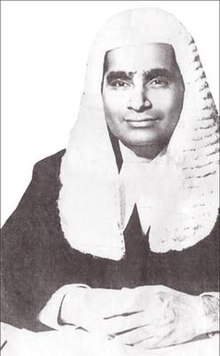S. Nadesan
|
Senator S. Nadesan QC |
|
|---|---|
 |
|
| Member of the Senate of Ceylon | |
|
In office 1947–1971 |
|
| Personal details | |
| Born |
11 February 1904 Anaikoddai, Ceylon |
| Died | 21 December 1986 (aged 82) |
| Political party | Independent |
| Alma mater | Ceylon University College |
| Profession | Lawyer |
| Ethnicity | Sri Lankan Tamil |
Somasundaram Nadesan, QC (Tamil: சோமசுந்தரம் நடேசன்; 11 February 1904 – 21 December 1986) was a leading Sri Lankan Tamil lawyer, civil rights activist and member of the Senate of Ceylon.
Nadesan was born on 11 February 1904 in Anaikoddai in northern Ceylon. His father was a school administrator and Nadesan was educated at Jaffna Hindu College before entering Royal College, Colombo on a Governor's scholarship. After school he joined Ceylon University College before proceeding to Ceylon Law College, qualifying as an advocate of the Supreme Court in 1932.
Nadesan started practising law in the 1930s. His practice became very successful and Nadesan appeared in some of the most famous legal cases in Ceylonese history: Abdul Aziz sedition (1943); Abdul Aziz criminal trespass (1959); Press Council Bill (1972); Pavidi Handa (Voice of Clergy) fundamental review (1982); Saturday Review/Aththa ban fundamental review (1983); Paul Nallanayagam treason case (1986). He served on the bar for 55 years and was made a Queen's Counsel in 1954. He was president of the Bar Council from 1970 to 1972.
Following the problems caused by the Sinhala Only Act Nadesan wrote a series of articles Sunday Observer in which he argued that conflict between the Sinhalese and Tamil nations could only be resolved by democratic principles such as bilingualism, federalism, regional autonomy and constitutional safeguards for minorities. He dismissed the suggestion that federalism could lead separation, saying that separatist movements only took root in unitary states.
...
Wikipedia
